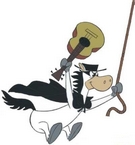mikemike
Posts: 501
Joined: 6/3/2004
From: a maze of twisty little passages, all different
Status: offline

|
quote:
ORIGINAL: dpstafford
Can you tell us more about german/austrian dialects, and how they relate to "high" german?
I'm not a language specialist, so what I can tell you is not the whole story. "Hochdeutsch" or "High German" or Standard German is how we Germans believe the written language should be correctly pronounced. I needn't tell you that hardly anybody outside the media and the stage really speaks a clean High German. The people in the Hannover area think they do; we others think there are issues with their "st" and "sp" diphtongs.
High German is most closely related to the North German dialects (Niederdeutsch or Low German), which are spoken in the coastal plains area of Germany from the Polish border west to the Netherlands - Dutch is originally a North German dialect, although the modern Dutch will vehemently deny this. There are a number of other dialect groups, for instance the Allemannic dialects spoken in Southwest Germany/Alsace/Switzerland (of which the Palatine dialect - and its transatlantic derivative Pennsylvania Dutch- is a part), the Bavarian/Austrian group, the Rhenish dialects and others.
The point is, these dialects are more than just regional colorations of standard German, they differ in vocabulary, grammar and pronounciation. The dialect spoken, for instance, on the North Sea islands and the one from the German/Swiss border are perhaps more different than Spanish and Portuguese. However, people speaking regional dialects will usually also speak standard or High German with more or less of a regional coloration. You can usually tell a Bavarian speaking Standard German from a Saxon or someone from Berlin, just as Americans can tell if they are talking with someone from New England or the South or California.
You might say that most Germans have two language layers - Standard German and the regional dialect, which is unusual linguistically.
This has practical consequences. Take Swiss German as an example: if a Swiss makes the effort to speak Standard German you will probably understand him quite well if you can understand the kind of German taught in school, but if he switches to the Swiss German dialect you'll be lost - a British author once likened it to switching on a scrambler. The Swiss TV German news actually show German subtitles if Swiss German is spoken.
You can probably read all this far more cogently in the Wikipedia.
And now for some light relief: in answer to DSwains message I'd like to remark that British ale is probably a perfect fit to British taste buds. If you have ever experienced British "Cuisine" - 'nuff said. :)))
_____________________________
DON´T PANIC - IT´S ALL JUST ONES AND ZEROES!
|
 Printable Version
Printable Version



























 New Messages
New Messages No New Messages
No New Messages Hot Topic w/ New Messages
Hot Topic w/ New Messages Hot Topic w/o New Messages
Hot Topic w/o New Messages Locked w/ New Messages
Locked w/ New Messages Locked w/o New Messages
Locked w/o New Messages Post New Thread
Post New Thread